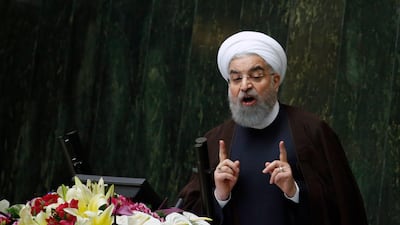The US warned on Tuesday it would continue to punish Iran’s “non-nuclear destabilising activities” after Hassan Rouhani said his country could restart its nuclear programme within hours if Washington imposes new sanctions.
In his first address to Iran's parliament since being sworn in to a second term, the Iranian president suggested his country could quickly ramp enrichment up to levels even higher than before it signed a nuclear accord with world powers.
Responding to Mr Rouhani's threats, a US State Department official told The National: "the Trump administration remains committed to addressing the full range of threats Iran poses to the United States and regional stability, including its continuing ballistic missile development."
The exchange comes as tensions between Tehran and Washington increase over the 2015 accord that lifted international economic sanctions in return for strict limits on Iran’s nuclear production capabilities.
Iran tested a powerful new ballistic missile last month that resulted in new US sanctions, and last week parliament voted overwhelmingly to increase budget spending to US$260 million for the ballistic missile programme — which is not limited by the nuclear deal. The vote also covered a further US$260 million spending on regional operations of the Islamic Revolutionary Guard Corps’ foreign wing, the Quds Force, which is leading a range of militias in Syria and Iraq.
Read more: Iranian drone comes close to US carrier in Arabian Gulf for second time in a week
The GCC and the United States are planning a joint meeting to discuss non-nuclear sanctions on Iran, Abdel Aziz Abu Hamad Aluwaisheg, assistant secretary general for foreign affairs at the GCC, confirmed to The National.
The meeting would target "Iranian entities destabilising the region as well as Hizbollah" and would create "joint US-GCC blacklists" according to a report in Asharq Al Awsat newspaper.
Mr Aluwaisheg said the meeting may take place in September and that conversations on the effort "are already happening".
The focus of Mr Rouhani’s speech was on his plans to reform and revitalise Iran’s struggling economy, which has not seen quick gains from its integration back into world markets.
This is partly due to the new US administration’s confrontational approach to Iran and stated desire to pull out of the Joint Comprehensive Plan of Action nuclear deal (JCPOA), signed by the two countries as well as all five permanent members of the UN Security Council and Germany.
"Those who try to return to the language of threats and sanctions are prisoners of their past delusions," Mr Rouhani said. "If they want to go back to that experience, definitely in a short time — not weeks or months, but in the scale of hours and days — we will return to our previous [nuclear] situation very much stronger."
Mr Rouhani attacked his US counterpart, saying Mr Trump had shown the world that Washington is an unreliable partner, even for allies, and referred to the Paris climate accord and trade agreements.
"In recent months, the world has witnessed that the US, in addition to its constant and repetitive breaking of its promises in the JCPOA, has ignored several other global agreements and shown its allies that the US is neither a good partner nor a reliable negotiating party," he said.
Mr Trump has said he is searching for ways to find Iran non-compliant with the accord, though there is no evidence it has breached the deal, and the other world powers would not reapply sanctions if Washington withdrew unilaterally.
His administration and the US congress have continued to increase US sanctions, including on individuals and entities associated with Iran’s ballistic missile development programme and their associates, as well as new terrorism-related sanctions on the IRGC.
But analysts cautioned that Mr Rouhani’s remarks on the nuclear deal do not indicate that Iran is close to, or even considering, pulling out of the deal. It is much more likely a tactical move to protect the moderate president’s political flank on the right from the IRGC and other hardliners who oppose the cultural and economic opening that the deal is intended to facilitate, but which could weaken their grip on society and on the economy.
“I clearly do not think it is alarming,” said Marc Martinez, Iran analyst at the Delma Institute in Abu Dhabi. “It is a political speech for a domestic audience and a display of unity” as Washington steps up pressure.
“Rouhani's remarks are a classic act of political bravado, but the president's intentions [and] Iran's intentions are quite evident when we consider that Javad Zarif was reappointed minister of foreign affairs,” Mr Martinez said. “Iran is highly benefiting from the JCPOA, and it makes the calculus that the international community will not support Trump's adventurism.”
Mr Zarif led the two years of negotiations with the US and world powers that led to the signing of the deal in 2015 and its implementation last year.
The deal was overwhelmingly popular with Iranians, who voted Mr Rouhani back into office despite slow gains to the economy. Mr Rouhani has sought to use that mandate to try and arrogate more political power to his moderate camp, although his attempts have not always been successful.
No women were named to his new cabinet, despite campaign promises to promote women’s rights.
"I wanted to nominate three women ministers but it did not happen," Mr Rouhani said during the speech on Tuesday.
But the defence minister nomination was given to a general of the army, Brigadier General Amir Hatami, rather than an IRGC member, the first time since 1993 that a regular army commander will hold the post. While parliament still must approve the proposed cabinet, no changes are expected as negotiations over its composition have already been conducted with the supreme leader, Ayatollah Ali Khamanei.
“Even if Amir Hatami was the former deputy it is still a blow for the IRGC,” Mr Martinez said, adding that now the Iranian president “cannot afford further tensions” with the powerful organisation.

